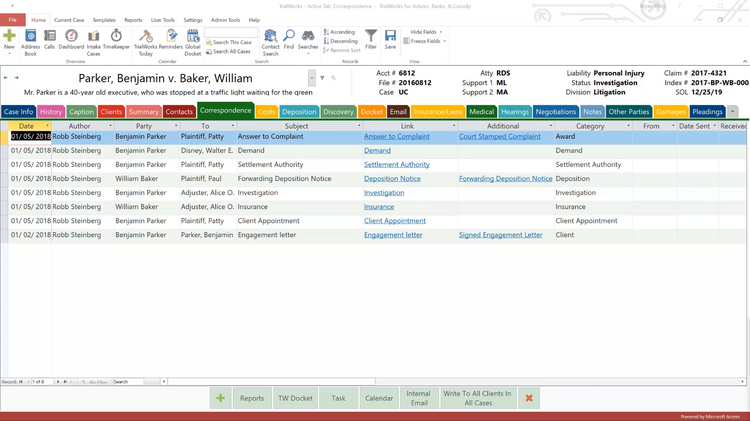The Best Case Management Software
Get the best software for your business. Compare product reviews, pricing below.
What is Case Management Software?
Case management software tracks data for legal cases through document storage, calendars, case status reports, and improved reporting. Also known as legal case management software, matter management software, or legal project management, these solutions work as a subset of legal practice management software by covering a range of applications used by law firms and courts to manage the lifecycle of a case more effectively.
Used by legal staff, clients, and outside counsel, case management software simplifies complicated processes such as billing, deadlines, and time tracking with the goal of increasing efficiency and maximizing revenue. Attorneys who work on large-scale, document-intensive litigation tend to leverage case management software to their advantage the most.
Case management software manages law firm cases that range from client intake to legal billing and everything in between. By keeping these case details organized and streamlining standardized processes, legal case management systems will aim to create a more efficient and competitive law firm.
Some may consider matter management software to be synonymous with case management software. While they share many similarities, some believe matter management software is more robust–allowing users to create and open matters, assign attorneys and timekeepers to matters, and report on who worked on what and for how long. This type of legal case management software has strong reporting insights to help you determine who is helping the business achieve its goals the fastest.
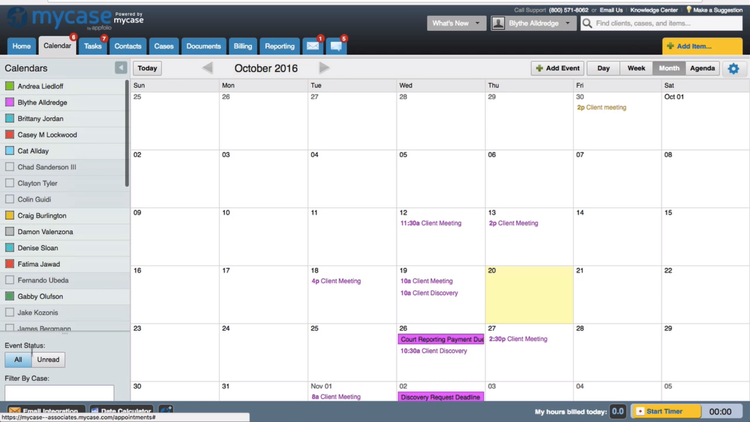
Features of Case Management Software
- Practice Management: Allow quick searches of the legal case database, track notes on cases, view documents, check calendars, and monitor for conflicts of interest.
- Document Management: Generate, search, edit, and archive legal documents. Share documents internally. Add contact details of clients, vendors, opposing counsel, and grant access to certain documents. Allow guests to upload documents.
- Conflict Check: Create an aggregated database of available attorneys at a firm which users can search using details about a client or a case to determine if an attorney has a conflict of interest with the case at hand.
- Time and Billing: Track billable hours, fees, and expenses. Generate and save invoices that can be sent to clients through built-in messaging tools. Ensure time is tracked with phase codes, task codes, activity codes, and more. Include billable expenses such as court fees or expert witness expenses.
- Task Management: Organize, allocate, and collaborate on tasks at your law firm. Prioritize your workload using customizable task attributes like priority, status, and category. Email team members such as reminders or notifications of task completion.
- Legal Accounting: Includes financial management tools for law firms such as check printing, payroll, budgeting, and top-level financial reports. May also include trust accounting, cash management, and bank reconciliation when managing investments across a client portfolio.
- e-Signatures: Accept electronic signatures on various legal documents through secure forms and links that allow clients to confidently review documents and agreements before sending them back to your firm.
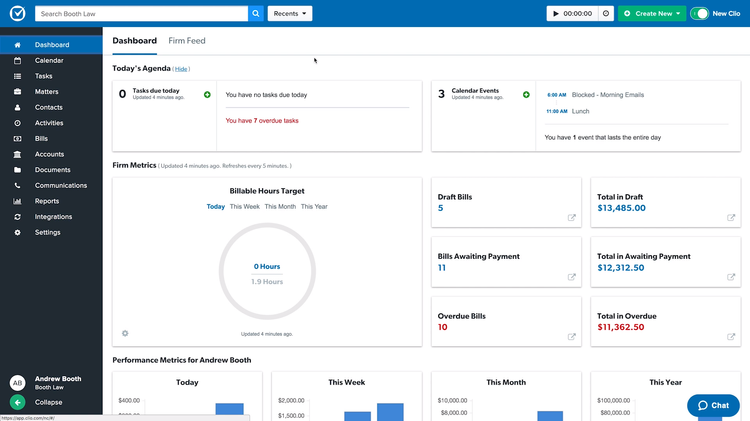
Benefits of Case Management Software
The functionalities and benefits of legal case management software include:
Improved Workflow and Automation Through Organization
Given the large volume of case-related data that a law firm can generate, whenever legal case files are misplaced or incorrectly organized, your firm can easily miss key pieces of information and/or crucial deadlines. By keeping all data organized within the confines of one system, a case management solution will allow an easy way to view tasks, lists, notes, descriptions, deadlines, and more–all from one centralized location.
A case management system will store all your data into easy-to-understand sections that are easily accessible–letting users search for the files they need or organize files into buckets (case files) to view all relevant information pertaining to their current case workload. When it’s time to gather case details, rather than grab information from multiple sources, a case management software will already hold briefs, pleadings, and transcripts within a folder of its own–meaning most of your data collection will already be available.
Users of the software will be able to enter details about their cases (such as descriptions, deadlines, and contact details for involved parties) and continuously complete tasks, take notes, and more. By being able to quickly and easily access this information, follow-up communication will become a streamlined process and part of the day-to-day operation of using case management software. It may also integrate with email communication, phone calling systems, and any other way you may speak with clients–ensuring notes are updated whenever necessary.
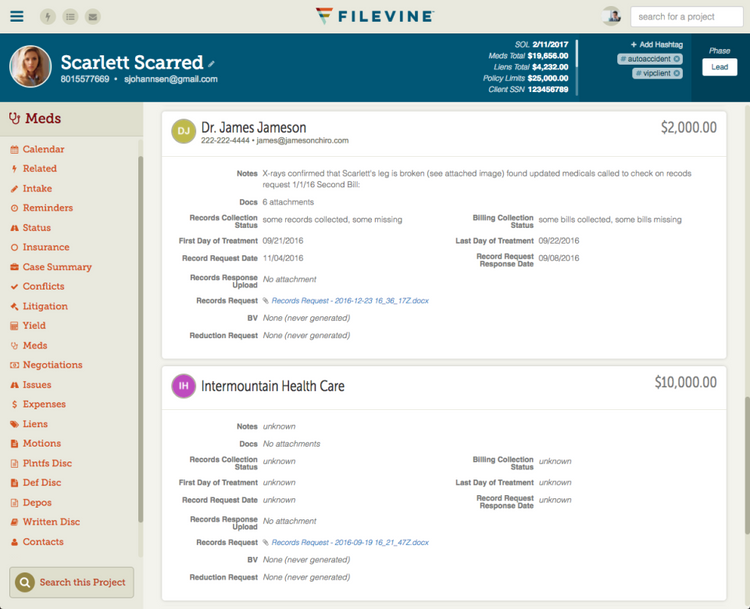
Automate Time Tracking and Billing
Tracking billable time is a key part of any legal business and a critical component of case management. By automating billing and invoicing for both inside and outside counsel, you’ll have a complete visual over every minute your staff has spent working on a case. Time can usually be keyed in whether in the office, at home, or via a mobile device.
Law practices can customize rates to bill the same tasks at different amounts depending on the client being served. These rates can be stored and calculated by the software–minimizing the risk involved with human data entry every time new time is logged. With an increased level of efficiency calculating billable hours against variable rates, you’ll also allow for better estimates–leading to more effective negotiations and a higher level of client satisfaction.
If clients want to dispute their bill or discuss it in any capacity, communication tools within case management software allow clients to respond faster to claims they have. If an internal messaging system is not provided, most client management software will sync to email services such as Gmail or Outlook–allowing you to integrate communications about bills directly into your software and pair it with the appropriate contact record.
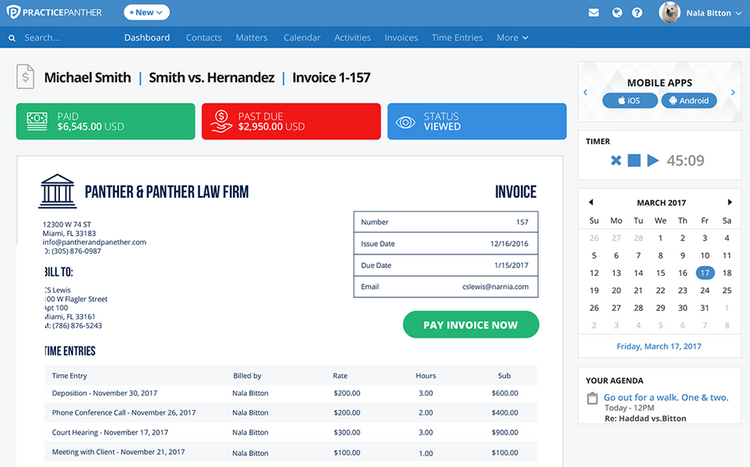
Case Management Software Pricing
The cost of case management software starts at $15/month. The pricing model for case management software will depending on the functionality required and the number of users. The starting price for most systems will range from $15-$85/user/month. There may also be upfront costs for setup, which may include implementation assistance and/or training from your software provider.
Given the number of users needed on a system, the total monthly/yearly cost can grow quickly. Cloud-based systems will usually have a pay-as-you-go monthly subscription–making it a more cash-flow friendly option. Meanwhile, on-premise or legacy/self-hosted options will incur larger upfront costs, with an average law firm paying upwards of $25,000-$35,000 in year 1, and about $10,000-$20,000/year thereafter for things such as maintenance, backup, and more.
Case Management Software Trends
The legal industry is facing many challenges that call for an improvement in software and technology trends. Some examples include:
The Rise of Cloud Technologies
Between 2016 and 2017, 40% of attorneys relied on cloud computing. As of 2019, 74% of law firms are at least “somewhat” or “slightly” cloud-based–and another 12% are “mostly” or “completely” cloud-based according to a Business of Law and Legal Technology Survey. But are they running critical systems in the cloud, or simply allowing for their documents to be more easily accessible from remote locations?
The same 2019 Aderant survey asked just that question: “When will your law office move critical systems into the cloud?”
- 34% said this system is already hosted in the cloud or headed that way within two years;
- 37% also said this would not happen in the foreseeable future;
- 1% said it would never happen; and
- 28% were unsure.
Whatever current feelings exist regarding the use of cloud technology for critical case management systems, things seem to be trending towards allowing for more widespread adoption. The original barrier to implementing cloud technology was the client, who may have opposed their casework data being stored in such a manner.
Today, most clients work for businesses that rely on the cloud and already host sensitive data, including customer data, financial data, and data that includes trade secrets. In fact, the American Bar Association (ABA) found that 96% of all businesses reported using cloud services. This was discovered as part of their 2018 Legal Technology Survey Report, which also discovered that cloud usage grew to 55% (up from the previously mentioned 40%).
Clients also want better collaboration with their firms–something only cloud-based case management software would be able to handle. With many law firms having already used the cloud in minor ways (such as through the use of email and legal document management systems), feelings towards managing their entire caseloads via an online case management platform have become something lawyers are more receptive to.
The Rise of Remote Work
Something that goes hand in hand with the overall rise of cloud technologies within the legal industry is the desire (or even the necessity) to work remotely. The COVID-19 pandemic required many law offices to evolve a cloud-computing strategy must faster than anticipated. This meant lawyers, bookkeepers, and paralegals were not having to deal with financials, real estate, billing, and their overall productivity within their home office.
Remote work can bring up a number of work culture issues–such as firm loyalty, training, and mentorship. To keep staff happy, many law offices may offer flexibility when it comes to offering remote work for employees that may have become accustomed to it.
To accommodate the rise of workers who desire remote work, law firms will want to eye the right case management tool that allows employees to do their work from home as effectively as if they were in the office. This includes tracking their own time and billing, managing digital payments, using whatever legal research tools necessary, and more.
A Change In Communication Strategies
The rise of cloud technology along with remote work opportunities also means the way law firms and clients communicate with each other has or will continue to change. Many lawyers have pivoted to find new ways to engage with current and prospective clients–clients who may prefer to avoid face-to-face meetings and communicate via video conferencing through services such as Zoom and Google Hangouts.
Video conferencing has also found its way into criminal law. The COVID-19 fiscal stimulus law (the Coronavirus Aid, Relief, and Economic Security Act, Public Law No: 116-136–also known as the CARES Act), authorizes new criminal justice procedures by video or telephone in certain circumstances. This means federal courts can conduct video teleconferencing or telephone conferencing for detention hearings, initial appearances, preliminary hearings, waivers of an indictment, arraignments, and misdemeanor pleas and sentences.
Many lawyers handling criminal legal caseloads will desire case management software that can adapt to the changing laws. This may mean today’s lawyers desire to have a way to save video transcripts of these sessions and attach them to a particular case file. By doing so, a firm should be able to better build trust with clients through consistent record-keeping–allowing the firm to become more client-focused and differentiate itself from firms that may not have this capability.
